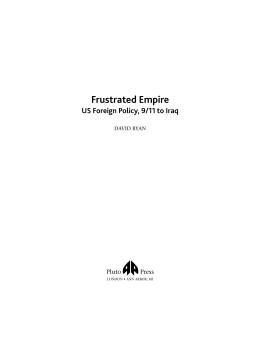
Additional Information
Book Details
Abstract
Examining the broad contexts of US foreign policy and the lingering aftermath of the Vietnam War, David Ryan argues that these events created an opportunistic framing of 9/11, paving the way for the long-held neo-conservative desire for regime change and war in Iraq.
He examines the construction of the cultural framework for war following 9/11, the legitimacy of military force in Afghanistan, the rise of anti-Americanism, within the broader contexts over the struggle over legitimacy, identity and leadership.
Turning the 'clash of civilisations' thesis on its head, Ryan presents a careful analysis of the evolution of US foreign policy and its engagement with Iraq through the 1980s. While 9/11 provided the opportunity, the post-Vietnam context provides a more pertinent framework for this reflection on the Gulf War, the Iraq War and the strategic implications for US foreign policy.
'A brilliant meditation on the nature of the American empire. Few books I've read on recent US foreign policy cut both as deep and as broadly as this one'
Professor Marilyn Young, New York University
'A majestic work, moving from the Cold War to now, to explore how our narratives of 'history', 'justice', and 'freedom' are manipulated by the US Government in the pursuit of its global objectives'
Professor William S. Lucas, University of Birmingham
'A fine example of how to write contemporary history. His book spans the years of our new longest war with insight and, by making essential connections between politics and culture, provides readers with a real understanding of the dilemmas of the American empire'
Professor Lloyd Gardner, Rutgers University
